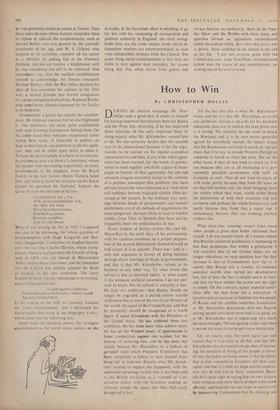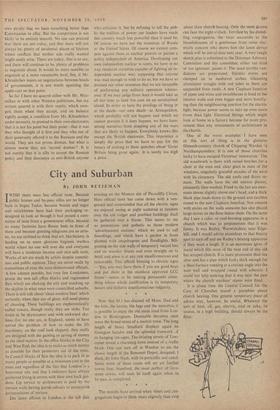How to Win
By CHRISTOPHER HOLLIS
DURING the election campaign Mr. Mac- millan took a good deal of credit to himself for having improved the relations between RusSia and the West; but, obviously, if he has improved those relations, he has only improved them by doing exactly what Mr. Khrushchev wanted him to do. No one seriously doubts that the sensible way to do international business is for the nego- tiations to be carried on by regular accredited representatives and then, if you wish, when agree- ment has been reached, for the heads of govern- ments to meet together and drink a glass of cham- pagne in honour of that agreement. No one can seriously imagine anywhere except in the columns of a popular newspaper that problems that have proved intractable when discussed at a 'over level will suddenly become magically soluble when dis- cussed at the summit. In the ordinary way meet- ings between heads of governments and summit conferences are of all methods of negotiations the most dangerous, the least likely to lead to 'fruitful results; from Tilsit to Munich they have not in- frequently been the preliminaries of war.
Every student of history knows this and Mr. Macmillan in the early days of his premiership. with his cautious insistence on a proper prepara- tion of the ground beforehand, showed himself as well aware of it as anyone. There was—and is— only one argument in favour of doing business through direct meetings of heads of governments, and that is that Mr. Khrushchev refuses to do business in any other way. To what extent this refusal is due to personal vanity, to what extent to his domestic political necessities I do not pre- tend to know, but his refusal is certainly a fact. He had two ambitions—that Russia should no longer be regarded as a pariah nation outside civilisation but as one of the two Great Powers of the world, the equal of the United States, and that he personally should be recognised as a world figure of equal dimensions with the President of the United States. He has achieved these two ambitions. He has done more than achieve them. He has set the Western heads of government in bitter competition anAinst one another for the honour of receiving 'him, and he has done this mainly because Mr. Macmillan set a fashion of personal visits which President Eisenhower has Aieen compelled to follow to save himself from being left in isolation. Exactly what Mr. Krush- chev wanted to happen has happened, with the additional advantage to him that it has been sold to the British electorate as a triumph' of Con- servative policy with the Socialists making no criticism except the claim that 'they had really thought of it first. Yet the fact that this is what Mr. Khrushchev wants and the fact that Mr. Macmillan, as would any politician, dresses it up a bit for his domestic electorate, does not in itself in the least prove that it is wrong. We certainly do not want to attack the Russians, and it is by now pretty generally agreed by everybody outside the lunatic fringe that the Russians do not want to attack us—do not want, that is to say, to invade Western Europe or suddenly to homb us from the skies., But on the other hand, if they do not want to attack us, it is not because they are at all reconciled to a per- manently peaceful ..co-existence with such an economy as ours. They do not want to attack us with arms, partly because they have the sense to see that full nuclear war, far from bringing them the victory which they want, would rather bring the destruction of both their. economy and our economy and perhaps, the whole human race, and partly because they think that a major war is unnecessary because they are winning anyway without one.
• What does -this 'winning' mean? Like many other people a great deal better informed than myself, I do not exactly know. If irmerely means that Russian industrial production is increasing so fast that prophecies that within a generation it will overtake that of the United States arc no longer ridiculous, we may question how far that increase is (We to Communism, how far it is merely that Russia was a country of immense potential wealth who started her development late, but at least the fact is certain and is in itself one that we have neither the power nor the right to resent. On the contrary, easier material' condi- tions offer the best hope for a relaxation f:f tyranny and an increase in freedom for the people of Russia and the satellite countries. Fanaticism. as Mr. Macmillan discovered, does not flourish among people who have never had it so good, or. as Mr. Khrushchev put it, expressing very much the same thought, 'We are getting richer and when a person has more to eat he gets more democratic:
Yet, of course, only the most naive can feel certain that it is as easy as all this, and that Mr. Khrushchev has no interest except that of increas- ing the standard of living of his people at home. In fact, he makes no bones about it that he thinks that in free competition Socialism will beat capi- talism and. that it is both his hope and his expecta- tion that he will live to 'bury' capitalism. Basic- ally he is quite right in saying that the two systems must compete and show which of them is the more efficient, and basically we can hope to survive not by denouncing Communism but by showing our own people that we have something better than Communism to offer. But the competition is not likely to be entirely smooth. No one can pretend that there are not today, and that there will not always be, plenty of incidental places of friction where conflicts that neither side really wanted might easily arise. There are today, that is to say, and there will continue to be, plenty of problems to negotiate about. It would be more sensible to negotiate at a more reasonable level, but, if Mr. Khrushchev insists on negotiations between heads of governments, it is not worth upsetting the apple-cart on that point.
So far I have no quarrel either with Mr. Mac- millan or with other Western politicians, but my serious quarrel is with their vanity, which com- pels them when they accept, and on balance rightly accept, a condition from Mr. Khrushchev under necessity, to pretend to their own electorates that it is not his point but their point—that it was they who thought of it first and they who out of their generosity offered it to the Russians and the world. They are not prima donnas, but what is almost worse they are 'second donnas' ! It is not merely that it is silly to accept the Russian policy and then denounce as anti-British anyone who criticises it, but by refusing to tell the pub- lic the realities of power our leaders have made this country much less powerful than it need be. Of course we have not the resources of Russia or the United States. Of course we cannot com- pete against them as nuclear powers or pursue a policy independent of America. Developing our own independent nuclear wzapon, we have in no way rendered ourselves capable of fighting an in- dependent nuclear war, supposing that anyone was mad enough to wish to do so, but we have so drained our other resources that we are incapable of performing any military operation whatso- ever. If we may judge from Suez it would take us all our time to land five men on an uninhabited island. In order to have the privilege of being in at the death—our own death--at Armageddon. which probably will not happen and which we cannot prevent if it does happen, we have ham- strung ourselves from stopping any of the wars that are likely to happen. Everybody knows this except the British electorate. This impotence is simply the price that we have to pay for the luxury of making to them speeches about 'Great Britain being great again.' It is surely too high a price.







































































 Previous page
Previous page